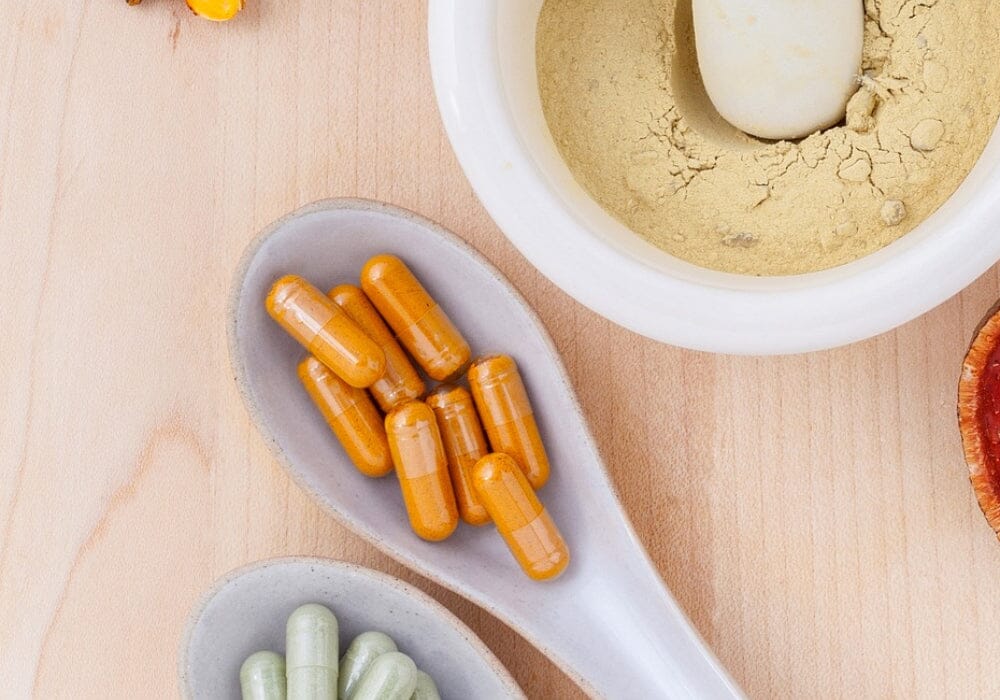Learn about the herbal blends, probiotics, lifestyle changes and other prescription drugs that could help with menopause symptoms as an alternative to HRT, or alongside it.
Hormone replacement therapy (HRT) is an effective treatment for a wide range of perimenopause and menopause symptoms. By replenishing reproductive hormones like oestrogen and progesterone lost during this time, HRT provides relief for many women.
But not everyone can take HRT – and not everyone wants to. In these cases, there are alternatives to HRT that may help, from natural approaches like probiotics, herbal supplements and lifestyle changes, to other prescription medicines.
Women who use HRT can benefit from some of these alternatives too. Many of the approaches we’ll assess in this article can provide extra support alongside hormone replacement therapy.
Probiotics
Probiotics are friendly bacteria that can help to improve the balance of your gut microbiome. That includes your estrobolome, the community of microorganisms that processes and redistributes oestrogen around your body.
Improving the health of your gut microbiome can boost your immune system, reduce chronic inflammation and lead to potential benefits all around your body.
Studies have identified several specific strains of probiotic bacteria that can help with many of the same menopause and perimenopause symptoms targeted by HRT, including:
- hot flushes and night sweats
- anxiety and mood issues
- brain fog and mental fatigue
- sleep quality
- bloating and constipation
- vaginal health
- bone density and osteoporosis risk
However, probiotics don’t need to be an alternative to HRT, they can also be taken alongside them to provide extra support.
The Better Gut probiotic supplements contain six of the most beneficial strains of bacteria in one daily dose.
To find out more, visit The Better Gut.
Other natural supplements
Certain herbal extracts and minerals can provide a natural alternative for some menopause symptoms if you’re unable to take hormone replacement therapy. They can also provide extra support if you’re using HRT.
Ashwagandha
The root of the ashwagandha shrub is a staple of traditional Ayurvedic medicine. In recent years, it’s been the subject of plenty of scientific research, particularly relating to menopause symptoms.
Studies suggest that ashwagandha may increase circulating oestrogen levels and that it can help to improve:
Magnesium
The mineral magnesium is essential for a wide range of processes around your body, including energy production, nerve and brain function, maintaining healthy bones and muscles, and supporting your sleep cycle.
Oestrogen helps your body process magnesium and as your oestrogen levels fall, so do your magnesium levels.
According to research, boosting your levels with a supplement could:
Ashwagandha and magnesium are both key ingredients in Better Night, a menopause supplement designed to reduce anxiety, boost your mood and improve sleep.
Better Night also contains an expert blend of other specially chosen herbal ingredients that can help with these symptoms, including saffron, lemon balm, chamomile, Montmorency cherry and vitamins B6, B12 and D3.
To find out more, visit Better Night. And get 10% off your first order with the discount code WELCOME10.
Other medications
If you’re unable to take HRT, or need extra support, your doctor may prescribe alternative drug treatments to help with certain menopause symptoms.
Antidepressants
Antidepressant medications known as selective serotonin reuptake inhibitors (SSRIs) or serotonin-noradrenalin reuptake inhibitors (SNRIs) can help with mood symptoms during perimenopause and after menopause if you’ve been diagnosed with depression or anxiety.
However, there’s still some debate around their appropriateness for mood problems caused by hormonal changes, with the UK’s Menopause Charity saying there’s not much evidence that antidepressants can help in these cases.
SSRIs and SNRIs can have some initial side effects, including anxiety itself, as well as sickness, dizziness and reduced sex drive, but these generally get better over time.
Clonidine
Clonidine – brand name Catapres – is a prescription medicine that can be used as an alternative to HRT to reduce hot flushes and night sweats during menopause. It’s also used to treat migraines and high blood pressure.
Clonidine is a vasodilator, meaning it relaxes and widens your blood vessels – it doesn’t affect your hormones.
Although clonidine can help with hot flushes and other conditions, for some people it can have side effects that overlap with other menopause symptoms, including dry mouth, constipation, drowsiness and depression.
Lifestyle changes
It’s no secret that lifestyle changes like getting more exercise and improving your diet can have huge benefits for your general health but there’s also plenty of evidence showing that they can help with many of the same menopause symptoms that HRT is used to treat.
Regular exercise
There are numerous studies demonstrating the positive impact regular exercise can have on specific menopause and perimenopause symptoms, including:
To maximise the effects of exercise, it’s a good idea to do both aerobic exercise – like brisk walking, running, cycling, swimming or dancing – several times a week, as well as some muscle strengthening work, such as weight training, bodyweight exercises or using resistance bands.
But remember, any physical activity is better than none and if regular exercise is new to you, start slowly and work your way up.
The Mediterranean diet
Following an eating pattern similar to the Mediterranean diet has been shown to reduce menopause symptoms including hot flushes, anxiety and sleep problems in both postmenopausal women and those going through perimenopause.
On the Mediterranean diet, you eat:
- a wide range of fruits and vegetables
- legumes like beans and pulses
- whole grains
- nuts and seeds
- extra virgin olive oil
- some oily fish and poultry
- less sugar and refined carbs like white rice, bread and pasta
Eating plenty of legumes and extra virgin olive oil has been linked in particular to a lower risk of mood symptoms.
Limiting sugar and refined carbs, meanwhile, can help reduce the post-meal slumps that contribute to low energy, mood swings, irritability and brain fog.
Therapies and mindfulness
Learning how to reframe your thoughts and emotions, and using breathing techniques that lead to real physiological changes, can help you to take control of some of the most troubling symptoms of menopause and perimenopause.
Cognitive behavioural therapy
Cognitive Behavioural Therapy (CBT) is a kind of talking therapy that focuses on understanding and changing patterns of negative thinking.
CBT can also include educational elements and mindfulness practices such as deep breathing. Using these different approaches, CBT programmes can be designed to specifically target some of the same menopause symptoms that HRT is often used to treat, including:
As a treatment for menopause symptoms, CBT is backed by The UK’s National Institute for Health and Care Excellence (NICE), The British Menopause Society and The North American Menopause Society.
More than one review of the research has found that CBT can have enough of an impact on menopause symptoms to noticeably improve participants’ quality of life.
Mindfulness
Mindfulness practices like meditation, deep breathing techniques and yoga can help you to focus on your experiences ‘in the moment’ and allow you to observe your thoughts and feelings in a non-judgemental way.
Slowing your breathing can also have real physiological effects, like reducing levels of the stress hormone cortisol.
Studies suggest that mindfulness practices can be as effective as CBT at reducing certain psychological menopause symptoms like anxiety and mood swings.
Natural ‘eostrogen replacements’
You may have heard of bioidentical hormones, which are said by some people to be similar or identical to human female reproductive hormones like oestrogen.
Because they’re made from plants, these products are sometimes referred to as a more ‘natural’ and safer alternative to HRT.
Companies that provide them also describe them as a personalised approach because the balance of hormones you’re given is based on the hormone levels measured in your saliva.
However, bioidentical hormones are not regulated or tested in the same way as HRT and there’s no evidence that they are better or safer. There’s also nothing to suggest that the levels of hormones in your saliva are correlated with your menopause symptoms.
Bioidentical hormones are not to be confused with body identical hormones, which are those prescribed as HRT by the NHS. These are often also made from natural sources like plants but they’re much more closely regulated and there’s plenty of research to show they’re safe and that they work.
Summary
HRT is an effective treatment for many women during perimenopause and after menopause. However, it’s not appropriate for everyone.
Alternatives to HRT for tackling certain menopause symptoms include:
- specific probiotic strains
- certain natural supplements, such as those containing ashwagandha and magnesium
- other medications, including antidepressants and clonidine
- lifestyle changes like regular exercise and following a balanced, plant-based diet
- CBT and mindfulness practices
Many of these approaches can also provide extra support for women who do use HRT.
Bioidentical hormones are a form of hormone therapy but are not officially regulated or as well tested as HRT.
For help with a wide range of perimenopause and menopause symptoms, including hot flushes, anxiety, sleep problems, digestive issues and vaginal and urinary health, try The Better Gut probiotic supplements.
And for extra support with mood, anxiety and sleep, add Better Night, an expert-formulated blend of herbal extracts, vitamins and minerals containing ashwagandha and magnesium.
Visit The Better Menopause to find out more. And get 10% off your first order with the discount code WELCOME10.









